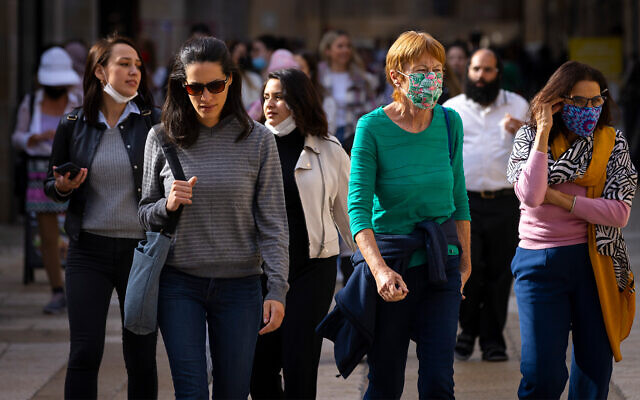Latest Israeli Travel Ban Frustrates Atlanta Travelers
Tourists are not allowed in Israel for at least the next two weeks.
After only four weeks of being open to tourism, Israel has prohibited tourists again as the new COVID-19 variant, Omicron, was confirmed in a handful of cases. As with other restrictions imposed during the nearly two-year pandemic, the Israeli government enacted the latest constraints practically from one moment to another. On Nov. 27, the COVID task force met and decided, after Shabbat ended in Israel and the new rules went into effect at midnight the next day, local time.

Atlantans like David and Eve Adler were caught in a lurch. It was still Shabbat in Atlanta. The Adlers had reservations to fly to New York and then on to Israel for nearly three months. They were excited to go visit their son, daughter-in-law and three grandchildren, especially because they would be spending Chanukah with them.
“I was suspicious on Friday when I heard that people from Africa would not be allowed into Israel,” said Eve Adler. “I remember saying, ‘I hope they don’t close the airport.’” The new variant was first discovered in South Africa and several countries — including Israel and the U.S. — immediately imposed flight restrictions for people coming from many African countries.
As soon as Shabbat ended, the Adlers were happy to get their negative COVID test results electronically, but then the news started filtering in that Israel would not allow tourists to arrive for the next two weeks. Consulting with their New York-based travel agent, as well as with Israelis who assist immigrants and their families, the Adlers were forced to make a decision about their trip based on contradictory advice.
“We didn’t know if we were coming or going,” Adler told the AJT.
They could choose to board their flights and take the chance that Israel would allow an entry that was scheduled for late afternoon on Monday — after the midnight closing. If entry was denied, they would have been immediately deported. In anguish, the Adlers decided not to take the chance and stayed home. They later learned that passengers on their planned flight were allowed into the country.
Those passengers, however, were required — under the new restrictions — to quarantine for three days and await a second negative COVID test in Israel, not counting the test they had had in Atlanta just days before their planned flights.

The Adlers are among hundreds of tourists who have first-degree relatives in Israel and are extraordinarily frustrated with the constantly changing limitations on their visits there. Facebook and other social media sites were red-hot with complaints and yearnings, on both sides of the Atlantic. Young Americans who had immigrated to Israel were upset that their families couldn’t join them for weddings, births, burials and Chanukah. Some expressed feelings of disillusionment that Israel didn’t seem to care about its immigrants, while others wondered if making aliyah was worth it.
On the other hand, like many others, the Adlers wondered if they should apply for Israeli citizenship just so they would be allowed to travel to and from the country during pandemics.
Meanwhile, Yad L’Olim, an organization that was launched by former Israeli legislator Dov Lipman to assist immigrants with family reunions, posted a message that said the Israeli government was planning on reconsidering its latest travel restrictions this week. The posting stated that exceptions would be made for those traveling to Israel for b’nai mitzvot and weddings for first-degree relatives.

Atlantan Cheri Levitan, CEO of Israel-based Kenes Tours, reported that she had some small groups of individual travelers who had booked reservations “after things opened on Nov. 1,” and now had to change their plans. “We have a Hillel group that was to leave the States on Dec. 26,” Levitan said. It’s still unknown if that trip will go through.
But it’s not only tourists who are impacted by the new restrictions. Israelis returning to Israel from abroad are required to quarantine for three days, regardless of vaccination status. If they are arriving from “red” countries, a more extensive quarantine is required. In addition, if a non-traveling Israeli is accidentally exposed to someone with the Omicron variant within Israel, that person is required to quarantine.
While these new travel constraints are angering both non-residents and residents of Israel, the government has decided that the Miss Universe beauty pageant scheduled for Dec. 12 in Eilat would go on as planned. During previous travel bans over the past two years, a few international sporting events also went on as scheduled.
The latest travel limitations have perhaps heightened frustrations even more because the gates to Israel only opened to tourists after more than a year’s hiatus.
“I told everyone from day one that, even with travel restarting [Nov. 1], we must proceed with cautious optimism,” said Levitan. “We are still navigating our way through a pandemic. This is the ‘new normal.’”
- Israel
- News
- Jan Jaben-Eilon
- Jerusalem
- Olivier Fitoussi
- Prime Minister Naftali Bennett
- coronavirus cabinet
- Kobi Gideon
- Cheri Levitan
- Kenes Tours
- Eve Adler
- pandemic
- COVID-19 variant
- omicron
- Dave Adler
- tourists
- Shabbat
- restrictions
- Israeli Government
- COVID Test
- Chanukah
- South Africa
- United States
- quarantine
- Atlanta
- social media sites
- Eilat
- Weddings
- births
- burials
- Yad L’Olim
- Dov Lipman
- Hillel
- vaccination status
- Miss Universe beauty pageant




comments